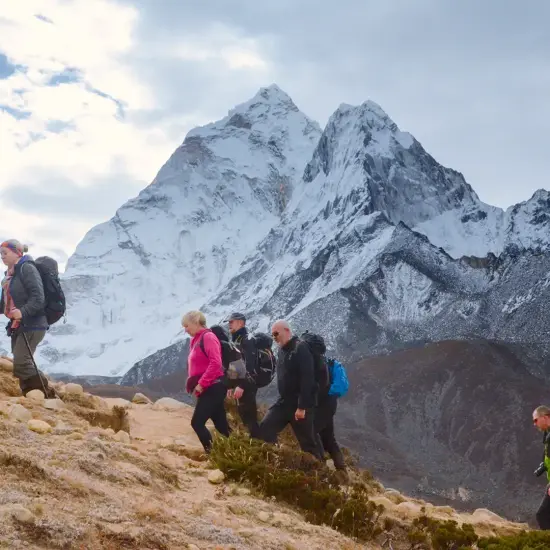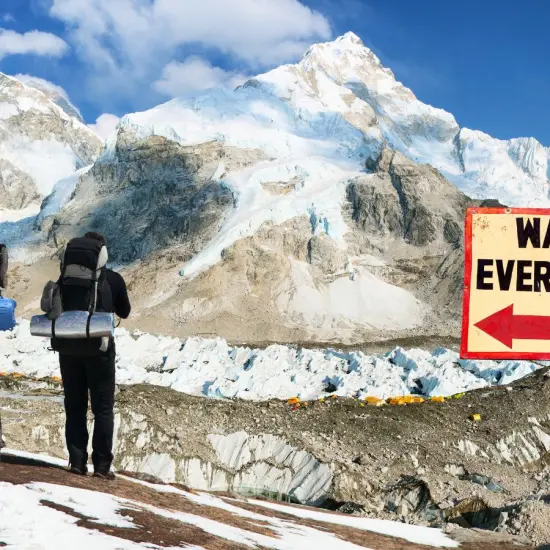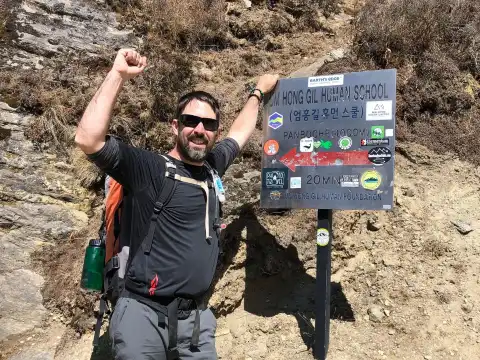The trek to Everest Base Camp, or EBC, is widely recognized as a global destination for trekkers, attracting adventurers from around the world to the mesmerizing Khumbu region, Nepal. At an elevation of 5364 meters (equivalent to 17,598 feet)
The trek to Everest Base Camp, or EBC, is widely recognized as a global destination for trekkers, attracting adventurers from around the world to the mesmerizing Khumbu region, Nepal. At an elevation of 5364 meters (equivalent to 17,598 feet), Everest Base Camp acts as a starting point for climbers to prepare themselves before embarking on a journey to summit the highest mountain on earth, Mount Everest.
Mt. Everest Base Camp also tops the list of must-do adventures for hikers seeking a high-altitude thrill amidst the Himalayan scenery. The shadowed trek is famous for its breathtaking panoramic views, rough terrain, and the chance it offers to dive into the rich Sherpa culture in that region. Trekkers will wind through small picturesque Sherpa villages, dense forests, high-altitude lakes, and tranquil monasteries.
How much Time is required to complete EBC?
The trek to Everest Base Camp usually takes 12-14 days, depending upon the itinerary, acclimatization, and the trekker's personal pace. However, these 12-14 days will become unforgettable, with many beautiful memories full of adventure and natural and cultural beauty.
The directions include several days of trekking and altitude adjustment to prevent altitude illness.
Everest Base Camp Trek Difficulty Level
The trek is slightly strenuous, with altitude being the most significant aspect challenging your endurance.
The best trek experience is at Everest Base Camp, at 5,364 meters (17,598 feet), where you can feel a sense of achievement. Most trekkers additionally ascend to Kala Patthar for panoramic perspectives, which is around 5,545 meters (18,192 feet) and includes one of the best sunrises your eyes can see.
Best Time for EBC Trek
Hitting the trails but not at the best time and missing the best experience while spending time and money is not a good deal, right?
Knowing the best season is essential. To answer this question, the ideal months for the trek are March to May (Spring) and September to November (Autumn). At this time of year, weather conditions become the most stable, and temperatures moderate.
Trek the Everest Base Camp Trek
This classic trek takes you through the heart of the Khumbu region, past vibrant Sherpa villages, ancient monasteries, and towering Himalayan peaks.
Where to start the Mount Everest Trek?
The trails toward the highest mountain in the world begin from Lukla, a small village with a scenic 45-minute flight from Kathmandu. The short, tricky runway at Lukla has become a legend. Then, the way to EBC passes through the beautiful villages of the Khumbu region: Phakding, Namche Bazaar, Tengboche, and Dingboche, moving toward Everest.
How much does EBC cost? Cost Breakdown
Understanding the Everest Base Camp Trek's Cost is more important before you start your trek.
Guided Trek (with a reliable agency):
- Cost: Usually around $1300 to $4,500 per person for a 12-14 day trek.
- What's included: The cost mainly includes the guide's services, porters (if hired), permits, transportation (round flights from Kathmandu to Lukla), accommodation in tea houses, and most meals during the trek.
- Why it's pricier: A guided trek usually offers a more comfortable, all-inclusive experience whereby the logistics are taken care of. Guides and porters generally are paid fairly, and food is provided; agencies pay for permits and local taxes.
Independent Trek (self-guided):
- Cost: The trek can cost between $900 and $1,250, not including international flights and personal expenses.
- What's included: The cost usually includes your trekking permits, Lukla flights, accommodation, and food. You must make all arrangements independently and may have to hire a local porter or guide (at additional cost) if you wish to have any assistance.
- Why it's cheaper: The costs are lower because you're arranging most of the logistics and arrangements yourself, but it can be a little unsafe. Still, arrangements like hiring a guide and/or porter can make your trip safer and sounder.
[trip:ebc-alternate-route]
Everest Base Camp Trek Cost
Here's a breakdown of the main costs involved in an Everest Base Camp Trek:
Flights to Lukla (Kathmandu to Lukla and return):
- Cost: Around $150 - $250 one way.
This is the primary mode of transport to initiate the trek, as there is no road access to the Everest region. Flights to Lukla are unreliable due to weather conditions; therefore, booking with Places Nepal, a reliable travel agency, is an excellent option.
Required Permits:
- Sagarmatha National Park Permit: NPR 3,000 (~$25 USD)
- Khumbu Pasang Lhamu Rural Municipality Permit: NPR 3,000 (~$25 USD)
You will need both these permits to trek in the Everest region. All this permits can be included in the package for guided treks, but for those going independent trekking, you have to get these permits in Lukla or Manjo.
Food and Accommodations in EBC Trek:
- Hotel/Teahouse Accommodation: The average cost of tea houses along the trekking trail is $5 - $15 per night. The higher you go, the more you pay, with the tea houses at higher elevations costing more. Accommodation is simple but decent. Most accommodations are shared with twin beds. Some tea houses have hot showers with an extra charge, and similarly, Wi-Fi is available at some with an additional charge.
- Meals: Approximately $5 - $10 per meal, but prices rise with altitude.
More information: During the trek, you will eat your meals at the teahouses, which serve a range of food from local Dal Bhat (lentil soup with rice) to more continental dishes such as pasta, noodles, and fried rice. Food can normally be very inexpensive; however, the longer you trek, the costlier it becomes due to the logistical problems of bringing all these supplies to such distant areas.
Porter/Guide (Optional):
- Porter: $15 - $25 per day.
- Guide: $30 - $40 per day.
Hiring a guide and/or porter will increase the cost. Porters typically carry 15-20 kg of your gear. A guide will lead the trek, provide information, and help with logistic tasks. Porters and guides are generally hired locally, and their wages are an essential source of income for Sherpas in the region.
Travel Insurance:
- About $50 - $150, with a helicopter rescue up to 6000 meters above sea level.
- Miscellaneous trip expenses, such as food supplies, bottled water, recharging electronic gadgets, hot showers, Wi-Fi, tips for guides and porters, and souvenir purchases en route, can add up. Allow an extra $100 - $200 for these miscellaneous expenses.
Medicine for altitude sickness and equipment:
Those who want to trek alone will have to incur costs in buying medicine, like Diamox used for altitude sickness and water purification tablets. However, you can book with us and enjoy the trek while we care for your necessities.
Tipping:
One also has to consider the aspect of tipping, which is practiced in Nepal, especially for guides and porters. You should budget a minimum of $100-$150 per guide and porter; if you are trekking as a group, this can be shared amongst fellow trekkers.
Total Estimated Cost Guided Trek (with the agency):
A fully supported trip, including all costs, flights, permits, full-board accommodation, guiding, and porter services, from around $1300 to $4,500 per person.
Independent Trek
An independent trek could cost between $900 and $1250, depending on how frugal you are with your travel arrangements and how many extras you want to add.
Trek the Short Everest Base Camp Trek
Trek the Everest Base Camp in 12 days: your fast-track Himalayan trekking.
The Everest Base Camp trek is definitely an experience to remember, but it does require some strategic planning and budgeting. Trekking independently will make the overall cost more reasonable, but you will worry about various things, making your trek not worth it to the fullest.
Going with a guide or agency will likely enhance your trip's convenience and safety. These extra services, like hiring a porter or guide and purchasing more food or permits on the route, can really add to the cost, but they are worth so much more than thought.
Whatever type of trek you choose, you must be well-prepared. Physical fitness and financial budgeting will help you enjoy the journey to Everest Base Camp.



















